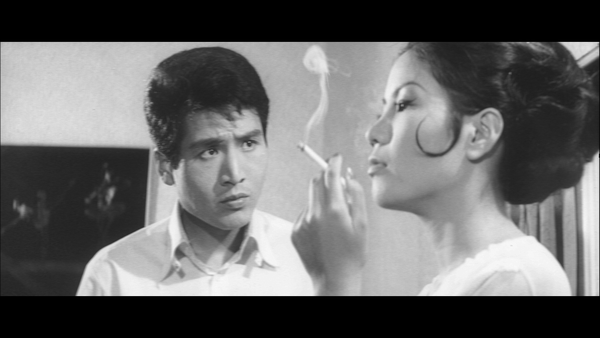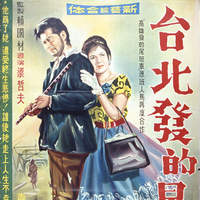Dangerous Youth
危險的青春
Guangming Film Company (廣明影業公司)
Producers: Gao Xingzhi (高幸枝) & Huang Yanxiu (黃衍修)
Director: Xin Qi (辛奇)
Screenplay: Xin Qi (辛奇) & Zhang Hongji (張宏基)
Cinematography: Liao Qingsong (廖慶松)
Sound: Lin Kunqi (林焜圻)
Editor: Huang Qiugui (黃秋貴)
Music: Huang Xishan (黃錫山)
Cast: Shi Ying (石英), Zheng Xiaofen (鄭小芬), Gao Xingzhi (高幸枝)
1969 - Black and White - 95 minutes
Synopsis
Kueiyuan (Shi Ying) is a deliveryman for a cosmetics company. He is a womaniser and dreams of making a quick buck. He meets a romantic 20-year-old girl, Qingmei (Zheng Xiaofen), who feels trapped by her mother’s small restaurant and is eager to escape. Kueiyuan earns a commission fee by introducing Qingmei to a cabaret, run by Yuchan (Gao Xingzhi). Qingmei falls in love with Kueiyuan and sleeps with him. However, under pressure from Kueiyuan and Yuchan, Qingmei agrees to become a mistress to an old millionaire. Meanwhile, Yuchan seduces Kueiyuan and controls him with money and sex. When Qingmei discovers that she is pregnant by Kueiyuan, the latter demands an abortion. Qingmei runs away and hides. When Kueiyuan proposes marriage to Yuchan and is rejected by her, he finally realises that he is in love with Qingmei and goes out to look for her.
Commentary
‘The stark, dark social realism of this film is rendered through a modernist, even avant-garde form, reminding audiences of French New Wave or early Nagisa Oshima (in particular Cruel Story of Youth, 1960): a long take of an angry young man on his motorcycle circling, its engine howling; a variety of pop songs raging on soundtrack; a montage of neon lights at urban night; composition-in-depth in conflict scenes; a daunting shot overlooking a sex act done on the floor; an open ending. Dangerous Youth remains a classic of Taiwanese cinema.’
Xin Qi (1924–2010) was one of the most popular and innovative filmmakers of the Taiwanese-language cinema. He directed a wide range of films such as The Night of the Jiayi Earthquake (Tianzai Dibian Bi Yi Ye, 1964) and Alias Lover (Shuangmian Qingren, 1965). The former was a disaster movie and the latter a horror sci-fi film, both of which created special effects that were unusual for Taiwanese-language cinema at the time. Xin Qi was most prolific in 1969, when he made fourteen movies. While most were slapstick comedies, there was also Dangerous Youth, not only a poignant and critical work in his repertoire, but also an outstanding achievement in Taiwan cinema as a whole.
As one of the scriptwriters of the film (credited under his birth name Xin Jinchuan), Xin Qi focused on the lower class, the outcast and the darker sides of the Taiwanese society during the transition from a rural to a modern economy. Xin critiqued materialism and greed. He also subverted the conventional gender hierarchy by making the cabaret hostess the most powerful character, because she wields two weapons: money and sex. Only when the protagonists recognize the importance of love are they able to resist the lure of empty pursuits and look forward to a future of happiness.
Audiences today should not take for granted Xin’s portrayal of complex characters in Dangerous Youth. Under authoritarian rule, the then KMT government practiced strict censorship and imposed many restrictions. The government would reject any plots that were deemed too cruel and frightening, politically incorrect, overly critical of authority or without positive dialogue. The most difficult aspect was the arbitrary application of these criteria. The local filmmakers thus relied heavily on Taiwanese opera troupes for material that was not only relatively easy to come by, but also politically and financially less risky for film adaptation. Sometimes Taiwanese-language filmmakers also sought inspiration from a variety of additional sources, including modern theatre groups, folklore, myths, news stories, current affairs, local and foreign novels and foreign movies. An original social commentary like Dangerous Youth is a rare find.
The film is clearly shot in Taiwan and the Taiwanese language is spoken throughout. Nevertheless, the characters occasionally refer to ‘Causeway Bay’ and ‘Peninsula Hotel’ in their dialogue. Perhaps these lines were the filmmaker’s deliberate attempt to appease the censors by implying that the story was actually set in Hong Kong. When we retrospectively reflect on the various censorship-avoiding tactics adopted by Taiwanese filmmakers during the days of the early film industry, we are temporarily transported back to history and obtain a little more understanding of what day-to-day politics might have felt like under Martial Law.
Records show that Xin Qi directed at least 52 feature films between 1957 and 1979. We have scattered materials about some of these films, while for some others only the film titles remain. This lack of information presents a major obstacle for the study of the Taiwanese-language cinema, because it means we are analysing ‘film history without film’. For this reason, the Taiwan Film Institute’s commitment to recover and restore the island’s lost film heritage is an important initiative. We are extremely pleased to be able to include two of Xin Qi’s early films in this project: The Bride Who Has Returned from Hell (1965, included in the Cinema Toolkit for its importance although it is not restored by the TFI) and Dangerous Youth (1969).
Text source and photocredit: https://taiyupian.uk/




